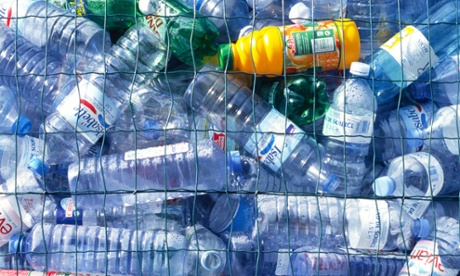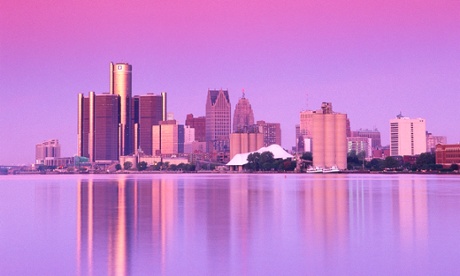Damn, looks like water wars might be the future
“Is now the time to buy water?” enquired the email that showed up in my inbox earlier this week.
Its authors weren’t worrying about my dehydration levels. Rather, they were urging me to think of water in quite a new way: as a commodity to invest in.
Making money from water? Is this what Wall Street wants next?
After spending nearly 30 years of my life writing about business and finance, including several years dedicated to the commodities market, the idea of treating water as a pure commodity – something to bought and sold on the open market by those in quest of a profit rather than trying to deliver it to their fellow citizens as a public service – made me pause.
Sure, I’ve grown up surrounded by bottled mineral water – Evian, Volvic, Perrier, Pellegrino and even more chi-chi brands – but that has always existed alongside a robust municipal water system that delivers clean water to whatever home I'm occupying. All it takes is turning a tap. The cost of that water is fractions of a penny compared to designer bottled water.
This summer, however, myriad business forces are combining to remind us that fresh water isn’t necessarily or automatically a free resource. It could all too easily end up becoming just another economic commodity.
At the forefront of this firestorm is Peter Brabeck, chairman and former CEO of Nestle.
In his view, citizens don’t have an automatic right to more than the water they require for mere “survival”, unless they can afford to pay for it. For context, the World Health Organization sets such “survival” consumption levels at a minimum of 20 liters a day for basic hygiene and food hygiene – higher, if you add laundry and bathing. If you’re reading this in the United States, the odds are that flushing your toilet consumes 50 liters of water a day.
Brabeck is right to argue that we risk depleting the world’s supply of fresh water irresponsibly through careless and thoughtless consumption of an apparently free resource. How many lush golf courses should we be sustaining with millions of gallons of water in parts of the world that are naturally arid, like Arizona or southern California?

And then there are the bizarre mixed messages that some California residents are getting: don’t water your lawns in the state’s long-running drought that has depleted its aquifers. On the other hand, some are also being warned they’ll be fined if they don’t keep their lawns and neighborhoods looking nice.
But Brabeck probably isn’t the best standard-bearer for the cause of responsible water management, by any stretch of the imagination.
Consider the fact that as the drought has worsened, Nestle’s Nestle Waters North Americas Inc division – the largest bottled water company in the country – has continued to pump water from an aquifer near Palm Springs, California, thanks to its partnership with the Morongo Band of Mission Indians. Their joint venture, bottling water from a spring on land owned by the band in Millard Canyon, has another advantage: since the Morongo are considered a sovereign nation, no one needs to report exactly how much water is being drawn from the aquifer.
In the Canadian province of British Columbia, Nestle has been using another loophole.
Until this year, British Columbia didn’t have rules that required the company to report how much it drew from the province’s aquifers – or pay a penny to the government’s coffers in exchange for the resource.
As of last year, therefore, Nestle was able to bottle 265m liters of fresh water and pay nothing for the resource that Brabeck believes should have an economic price attached to it – at least, when it is consumers that are paying that price. (For the record: the situation in BC is in the process of changing: a new Water Sustainability Act, passed this spring, will be fully in force by spring 2015.)
If you’re curious to know what a society existing on “survival” water supplies might look like, just take a glance at Detroit. When the city became the largest US municipality ever to file for bankruptcy protection, it’s not all that surprising that they began to look at the payments residents owed to city hall – including delinquent water bills.

Now, instead of letting it slide, the city is cutting off water – leaving thousands, perhaps more than 100,000 of the city’s 700,000 citizenswithout running water in their homes. If you can’t pay for your water, you won’t get it – although Nestle, and others, will truck in emergency supplies to make sure you’re receiving your “survival” level rations.
Today, throughout most of North America and Europe, we take the ready availability of clean, running water for granted.
We have forgotten what its relatively recent arrival on the scene – within the last 100 to 150 years – has meant for health, nutrition and hygiene – and for the development of society, business and industry, as a result. To the extent that we allow purely market forces to shape water consumption, we limit future contributions to our world to the scions of wealthy families.
There is a role for the free market in water, however. It comes at the bleeding edge: in the area of technologies that can be developed to treat waste water or desalinate water to make it usable or potable, or, alternatively, to develop ways to use less water in everything that we do now, from growing crops and making paper to producing iPhones.
A cluster of private equity firms is backing startups in this area – and that, in contrast to the bottled drinking water business, strikes me as a completely appropriate quest to way to profit – not from water itself, but from the need to consume water more efficiently.

After that, like everything else that is a public good, somehow we have to find a way to ensure that adequate supplies of clean water are available to everyone. And we might start by remembering that the summer’s horror story for those in Detroit is still an everyday reality for 40% of the world’s population – most of whom already live below the poverty line.
Imagine the impact on them of turning water into an economic commodity? I may applaud and share Brabeck’s overall concern about what is happening to our reserves of fresh water – but a little intellectual honesty on Nestle’s part about what is happening and what the real impact of his suggestions might be wouldn’t come amiss, either.
Most Users Ever Online: 698
Currently Online:
84 Guest(s)
Currently Browsing this Page:
1 Guest(s)
Top Posters:
easytapper: 2149
DangerDuke: 2030
groinkick: 1667
PorkChopsMmm: 1515
Gravel Road: 1455
Newest Members:
Forum Stats:
Groups: 1
Forums: 12
Topics: 11482
Posts: 58640
Member Stats:
Guest Posters: 2
Members: 19842
Moderators: 0
Admins: 1
Administrators: K

 Log In
Log In Home
Home
 Offline
Offline







